Would You Prefer a Booth, Mr. Lincoln?
(A Most Merry and Illustrated Collected
Biography of Early America's #1 Acting Family)
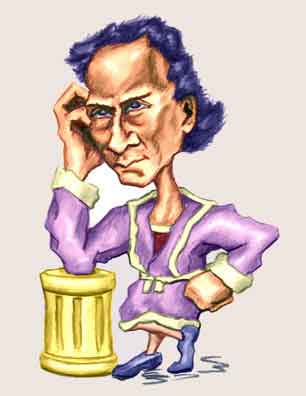
Edwin Booth
The Most Famous Booth
Today when actors are largely electronic images gamboling about the high definition wall-to-wall television screens (when not they're not entering rehab or serving 82 minute jail sentences), it's hard to imagine that not really all that long ago to see an actor you had to leave your house and go to a theater. And if you go back far enough you actually saw real people, not flickering celluloid images while you sat on bubble gum encrusted seats as popcorn crunched beneath your soda pop bespattered shoes.
Live action as a routine mode of entertainment ended in the Twentieth Century. Before then all entertainment was live and unelectronic. It was also bountiful and cheap. At any given theater you could see a new play every week. And none of that $175 a ticket stuff. The best seats in the house cost maybe a dollar, and the cheaper seats went for a quarter or even less.
Most of the plays from the Nineteenth Century have long been relegated to being period pieces if they're performed at all. That shouldn't be too surprising. After all, what was funny or dramatic even twenty years ago is corny today, and plays from a hundred and fifty years back are often incomprehensible.
One exception is Shakespeare. Since the day he penned his plays, Willie's been performed and actually enjoyed by audiences everywhere. It's hard for kids to appreciate it when they sit in school struggling through the ponderous Macbeth (who's wife had a potty mouth) and read the long winded interminable speeches of Hamlet (who spends a good chunk of the play talking to himself). But when performed Willie's plays are actually quite good, particularly if you see the shows like Much Ado About Nothing or Othello.
The first native born American whose true forte was Shakespeare had to be Edwin Booth (1833 - 1893). Edwin was also a major Shakespeare scholar since in his time a performance of one of William's plays often bore little resemblance to what the Bard actually wrote. But Edwin made sure that when he played Shakespeare, dang it, he played Shakespeare.
Edwin was (and is) considered the greatest American actor of the Nineteenth Century. Although we mostly have to take the critics' words for it, Edwin did record for Edison in 1890, reciting Othello's speech before the Venetian senate where he explains why he and Desdemona hit it off so well. Although of poor quality, the recording stands out in that his voice is far more mellow than what you usually hear in a Nineteenth Century voice recording. Given the bias of the early acoustics for the high tones, we can understand why Edwin was a natural for playing a brooding, tormented Hamlet.
Of course, Edwin was also the older brother of that even more (in)famous (at least today) American actor, John Wilkes Booth. But for years, Wilkes took second stage (no pun intended) to Edwin. During his lifetime, Wilkes was always "the brother of Edwin". Then in an instant on April 14, 1865, Edwin was suddenly the brother of Wilkes.
It was a rather troublesome transition to say the least. Edwin retired from the stage for eight months after the assassination, but returned to resume his (again) successful career. But he couldn't escape what his younger brother had wrought, and people would write him for information about Wilkes. His replies were polite, but not very informative. To one correspondent Edwin wrote that when he left home to pursue his acting career, Wilkes was only a schoolboy, and so he really didn't have much information about him.
John Wilkes Booth? Never heard of him.
Of course, Edwin having little contact with Wilkes is nonsense. They even performed together, for crying out loud, and that was less than six months before Lincoln's assassination. On November 25, 1864, Edwin, Wilkes, and their oldest brother, Junius, Jr. played the principals in Julius Caesar at the old Winter Garden Theater in New York. A clean shaven Wilkes played Mark Antony and Edwin played Brutus. Junius, Jr. took the role of Cassius, who, if Shakespeare is to be believed, was a heck of a lot smarter than Brutus.
Off stage, the Booths - including Edwin and Wilkes - would get together. But the Civil War divided the Booth family at least politically. Edwin was a strong Unionist and greatly admired Father Abraham while Wilkes (of course) supported the Confederacy and hated Lincoln's guts. It got to the point where Junius, Jr. forbade political discussions in his house when his two younger brothers were around.
Acting ran in the Booth's blood. Their dad was Junius Brutus Booth, Sr., who in the first half of the Eighteenth Century was the greatest Shakespearean actor of his day. Junius, though, was born, not in America, but in London in 1796. Fame came quickly and by his early twenties he had already established his acting reputation. Then in 1821 he and an eighteen year old woman name Mary Ann Holmes met and came to America. The move to the US was fortunate since in the New World Junius' reputation as an actor was reaffirmed. But more importantly, it also helped keep knowledge of Mary Ann away from Junius' wife, Adelaide, whom he left in England with their son Richard.
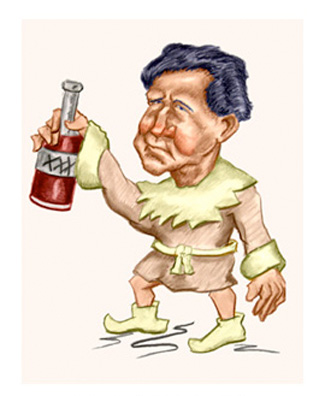
Junius Booth, Sr.
To Drink or Not to Drink was Rarely the Question.
The second Booth "family" (wink, wink) set up housekeeping in Bel Air, Maryland, a small town maybe ten miles south of the Pennsylvania border. Beginning in 1821 he and Mary Ann started cranking out a family. They ended up with ten children, six of which lived to adulthood, but none whom lived particularly long. If you made it to 60, that was a ripe old age for a Booth.
You'd think that Edwin saying he was taking thirty years for an acting tour in America might have raised Adelaide's suspicions, but evidently not. So when Richard grew up, he decided he'd come to the land of opportunity and see how his dad was getting on. He found out that Dad was getting on quite well, indeed, particularly with Mary Ann. Richard wrote back home to Mama about her hitherto unknown step-children, and Adelaide filed for divorce. So finally in 1851, Mary Ann and Junius, Sr. were married. That made Wilkes 13 years old when his folks got hitched. Junius died the next year.
Despite the glamor and the (sometimes) good money, the actor's lot was not always a happy one. Travel was a torturous, bone-jarring ordeal, the hotels were often unheated, bug-infested hovels, and you took your meals in whatever sleazy barroom or tavern you could find. So Edwin wanted his children to forswear the acting profession. But then as today kids don't pay much attention to their parents.
Three of the kids became noted actors: Junius, Jr., Edwin, and Wilkes. The youngest, Joseph tried his hand but was so bad that Edwin cried, "Get off the stage, for God's sake!" So Joseph became a doctor. A daughter, Asia (yes, she was named after the continent), didn't become an actor herself, but she married one, John Sleeper Clarke.
But it was really Edwin and Wilkes who shared their dad's talent. Junius Jr., eventually decided he was more management material, and while never completely forsaking the treading of the boards, went into the business side. Eventually he ran a number of theaters, all of which eventually went bankrupt.
For Junius, Sr., though, to drink or not to drink was rarely the questions. At times he was even potted on stage. Still his reputation never flagged, at least as an actor. But because he realized his drinking made him less than reliable, Junius, Sr. had the thirteen year old Edwin begin accompanying him as a chaperone and otherwise to keep him in line. It was on one of these trips and at the age of 15 that Edwin first appeared on a professional stage. He played Tressell, a minor part in Shakespeare's Richard III to be sure, but he got second billing to his dad.
Then, as now, acting was dominated by the "star" system. That meant that in any production most of the actors were paid relatively low wages while one or two big names made most of the dough. The way this was handled in the Nineteenth Century was you had "stock" theater companies where the actors were tied to a single theater. They might put on a new play every week or so, the stock players getting maybe $20 a week. But to draw the big crowds the companies would import a big name actor who might get anything from $500 to $1000 a week. The stars, then, were not attached to any theater or town but traveled from city to city for their engagements.
Wilkes started off as a stock player in 1855, but within three years had achieved "star" status. And the status was built on merit. In an effort not to embarrass his family name if he gave bad performances (which he sometimes did) or unjustly capitalize on being a Booth when he gave stellar performances (which he also did), he first performed under the names of J. B. Wilkes. But once he was established as a drawing card, he took the Booth name back.
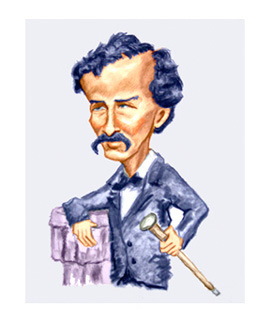
John Wilkes Booth
The most (in)famous Booth.
Overall Edwin was considered a better actor than Wilkes. Part of that was simply experience and part of it was style. Edwin preferred the serious, brooding roles while Wilkes went in for the action roles, sometimes jumping from heights as high as ten feet above the stage.
The two brothers also usually traveled different roads, Wilkes performing in the South in cities like Richmond , while Edwin acted mostly in the North. It may have been his time below the Mason-Dixon line that pushed Wilkes' sympathies toward distinctly Southern sentiments. But both brothers would tour all regions (Wilkes did perform in the North and even as far west as Detroit) but they clearly preferred certain parts of the country over others.
Lincoln, by the way, saw Wilkes perform at least once. In November, 1863, Lincoln took a night off to see "The Marble Heart", a thankfully forgotten play where Wilkes had one of the main roles. Lincoln saw it at Ford's Theater of all places, probably sitting in the same box where Wilkes shot him a year and a half later. During the performance, one of Lincoln's guests (who told the story), mentioned to Lincoln how whenever Wilkes, who was playing the villain, delivered a particularly threatening line, it looked like he was directing his remarks to the President. "He does look like he has it in for me, doesn't it?" Lincoln commented. The story goes on that Lincoln asked to meet Wilkes after the performance, but Wilkes gave the President the snub.
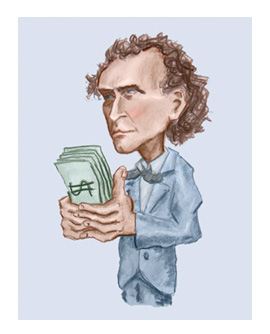
Junius Booth, Jr.
Management Material
Naturally there are conspiracy theorists regarding Lincoln's assassination who dream up convoluted and dire plots, with participants as varied as Edwin M. Stanton, the Secretary of War, and Major Henry Rathbone, who was sitting in the box with his fiancée, Clara Harris, as Lincoln's guest. That's how Booth got in, they say. Stanton made sure there was no guard posted so Booth, a two-bit actor, could walk right in. And Henry, of course, deliberately let Booth get away.
Well, for one thing, Wilkes was not a two bit actor (he often got quite good reviews), and Henry came close to getting killed when he tried to stop Booth. But more to the point, at that time there was no real security for the President. Virtually anyone could approach Lincoln, and the President literally had to wade through the crowds of job and office seekers that were buttonholing him in the corridors of the White House itself. They expected little, Lincoln said, and didn't get much.
The traditional story is that John Parks, the Washington policeman assigned to guard Lincoln, left his post and went drinking. He later (and this is documented) showed up the next morning at a police station after he arrested a - ahem - sporting woman. Later he was cleared of any dereliction of duty. Suspicious, no? Obviously some higher up was involved in the assassination and made sure his flunky John Parks got off. Right?
A number of less conspiratorial explanations have been given for the enigma of John Parks, who it must be admitted, doesn't seem to have been the most stellar member of Washington's finest. It is likely he took a seat to watch the play rather than stand at the door. But this may have been at Lincoln's direction, or that his assignment was simply to escort the President to the theater and leave the actual guarding of the door to someone else.
The latter explanation seems reasonable since on the fatal night, there was a man in "civilian" dress stationed outside the door leading to the box or at least sitting nearby monitoring the entrance. A number of people saw Wilkes walk up and speak with the man. One said Booth handed over his his calling card and was then allowed in.
That a famous actor would be allowed to see the President would not be unusual. Lincoln loved the theater and was always happy to meet members of the profession. One witness even said the messenger went into the box (presumably to present the card to Lincoln) and only then let Wilkes in. Therefore in all likelihood, Lincoln himself gave permission for Wilkes to enter.
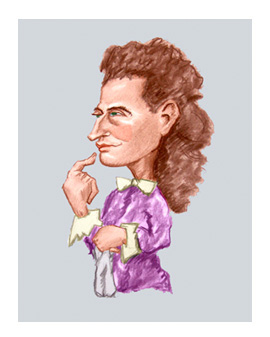
Asia Booth Clark
Named for the Continent
So who was the "guard"? It was probably Charles Forbes, Lincoln's messenger, valet, and an old family friend. (Lincoln, like all politicians, then and now, would pad his payroll with his friends and business acquaintances). Certainly that would explain why after the assassination Mary Lincoln detested Charles for the rest of her (and his) life.
Edwin Booth himself had an ironical close encounter with a Lincoln a couple of years earlier. Edwin was standing waiting for a train in Jersey City. There was a crowd waiting to buy their tickets from the conductor and the jostle and press of the crowd plus a shift of the train's position pushed a young passenger over the edge, wedging him feet first between the narrow space between the platform and the train. Edwin quickly reached down, and grabbing the hapless young man by the collar, pulled him to safety. The young passenger was none other than Robert, Lincoln's oldest son, who was surprised (and grateful) for the help of America's #1 actor.
Unlike much of what you read on the internet, this story is actually true. Robert confirmed it to several correspondents.